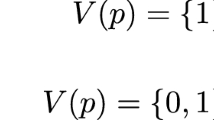Abstract
This paper describes an approach for reasoning in a dynamic domain with nondeterministic actions in which an agent’s (categorical) beliefs correspond to the simplest, or most plausible, course of events consistent with the agent’s observations and beliefs. The account is based on an epistemic extension of the situation calculus, a first-order theory of reasoning about action that accommodates sensing actions. In particular, the account is based on a qualitative theory of nondeterminism. Our position is that for commonsense reasoning, the world is most usefully regarded as deterministic, and that nondeterminism is an epistemic phenomenon, arising from an agent’s limited awareness and perception. The account offers several advantages: an agent has a set of categorical (as opposed to probabilistic) beliefs, yet can deal with equally-likely outcomes (such as in flipping a fair coin) or with outcomes of differing plausibility (such as an action that on rare occasions may fail). The agent maintains as its set of contingent beliefs the most plausible, or simplest, picture of the world, consistent with its beliefs and actions it believes it executed; yet it may modify these in light of later information.
Similar content being viewed by others
References
Alchourrón, C.E., P. Gärdenfors, and D. Makinson, On the logic of theory change: Partial meet contraction and revision functions, Journal of Symbolic Logic 50(2): 510–530, 1985.
Bacchus, F., J.Y. Halpern, and H.J. Levesque, Reasoning about noisy sensors and effectors in the situation calculus, Artificial Intelligence 111(1–2): 171–208, 1999.
Baral, C., Reasoning about actions: Non-deterministic effects, constraints, and qualification, in Proceedings of the International Joint Conference on Artificial Intelligence, Montréal, Canada, 1995, pp. 2017–2026.
Boutilier, C., R. Reiter, M. Soutchanski, and S. Thrun, Decision-theoretic, high-level agent programming in the situation calculus, in Proceedings of the (AAAI) Conference on Artificial Intelligence, Austin, TX, 2000, pp. 355–362.
Cimatti, A., M. Pistore, M. Roveri, and P. Traverso, Weak, strong, and strong cyclic planning via symbolic model checking, Artificial Intelligence 147(1–2): 35–84, 2003.
Darwiche, A., and J. Pearl, On the logic of iterated belief revision, Artificial Intelligence 89: 1–29, 1997.
Delgrande, J.P., and H.J. Levesque, Belief revision with sensing and fallible actions, in Thirteenth International Conference on Principles of Knowledge Representation and Reasoning, Rome, Italy, 2012.
Delgrande, J.P., and H.J. Levesque, A formal account of nondeterministic and failed actions, in Proceedings of the International Joint Conference on Artificial Intelligence, Beijing, China, 2012.
Fikes, R.F., and N.J. Nilsson, Strips: A new approach to the application of theorem proving to problem solving, Artificial Intelligence 2: 189–208, 1971.
Gärdenfors, P., Knowledge in Flux: Modelling the Dynamics of Epistemic States, The MIT Press, Cambridge, MA, 1988.
Gelfond, M., and V. Lifschitz, Action languages, Electronic Transactions on AI, 3, 1998.
Ginsberg, M.L., and D.E. Smith, Reasoning about action ii: The qualification problem, Artificial Intelligence 35(3): 311–342, 1988.
Jensen, R.M., M.M. Veloso, and R.E. Bryant, Fault tolerant planning: Toward probabilistic uncertainty models in symbolic non-deterministic planning, in S. Zilberstein, J. Koehler, and S. Koenig, (eds.), Proceedings of the Fourteenth International Conference on Automated Planning and Scheduling (ICAPS 2004), AAAI Press, 2004, pp. 335–344.
Katsuno, H., and A. Mendelzon, Propositional knowledge base revision and minimal change, Artificial Intelligence 52(3): 263–294, 1991.
Laplace, P., Essai philosophique sur les probabilités, first edn., (English trans: Dover, 1952), Paris, 1814.
Levesque, H.J., F. Pirri, and R. Reiter, Foundations for the situation calculus, Linköping Electronic Articles in Computer and Information Science 3: 18, 1998.
Levesque, H.J., R. Reiter, F. Lin, and R.B. Scherl, Golog: A logic programming language for dynamic domains, Journal of Logic Programming 31: 59–83, 1997.
McCarthy, J., Epistemological problems in artificial intelligence, in Proceedings of the International Joint Conference on Artificial Intelligence, Cambridge, MA, 1977, pp. 1038–1044.
Moore, R.C., Semantical considerations on nonmonotonic logic, Artificial Intelligence 25: 75–94, 1985.
Peppas, P., Belief revision, in F. van Harmelen, V. Lifschitz, and B. Porter, (eds.), Handbook of Knowledge Representation, Elsevier Science, San Diego, USA, 2008, pp. 317–359.
Pratt, V., Semantical considerations on Floyd-Hoare logic, in 17th IEEE Symposium on Foundations of Computer Science, 1976, pp. 109–121.
Reiter, R., Knowledge in Action: Logical Foundations for Specifying and Implementing Dynamical Systems, The MIT Press, Cambridge, MA, 2001.
Scherl, R.B., and H.J. Levesque, Knowledge, action, and the frame problem, Artificial Intelligence 144(1–2): 1–39, 2003.
Shanahan, M., Solving the frame problem - a mathematical investigation of the common sense law of inertia, MIT Press, 1997.
Shapiro, S., M. Pagnucco, Y. Lespérance, and H.J. Levesque, Iterated belief change in the situation calculus, Artificial Intelligence 175(1): 165–192, 2011.
Spohn, W., Ordinal conditional functions: A dynamic theory of epistemic states, in W.L. Harper, and B. Skyrms, (eds.), Causation in Decision, Belief Change, and Statistics, vol. II, Kluwer Academic Publishers, 1988, pp. 105–134.
Thielscher, M., The qualification problem: A solution to the problem of anomalous models, Artificial Intelligence 131(1–2): 1–37, 2001.
Author information
Authors and Affiliations
Corresponding author
Additional information
Presented by Jacek Malinowski
Rights and permissions
About this article
Cite this article
Delgrande, J.P., Levesque, H.J. An Epistemic Approach to Nondeterminism: Believing in the Simplest Course of Events. Stud Logica 107, 859–886 (2019). https://doi.org/10.1007/s11225-018-9808-6
Received:
Published:
Issue Date:
DOI: https://doi.org/10.1007/s11225-018-9808-6




